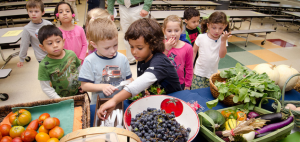By Grace Bowie

A grumbling stomach. A throbbing headache. Unable to concentrate. Struggling to stay awake. This is what a child suffering from chronic hunger experiences on a regular basis during a day at school.
Thirteen million children live in households that lack the means to get enough nutritious food on a regular basis. Research from Share Our Strength’s No Kid Hungry campaign shows that 22 million children rely on free or reduced-price school lunches, and 12 million rely on free or reduced-price school breakfasts. And with proposed budget cuts by President Donald Trump, even these few meals may soon be taken away. Improper nutrition—improper education.
It is with great fortune that I’ve never had to worry about where my next meal would come from, but for many children in America, it is a reality that they face daily.
However, hunger, particularly child hunger, is not a new problem. In fact, it can be seen in one of the most celebrated novels of all time: Les Misérables, by Victor Hugo. One of the novel’s most recognizable characters is a young boy named Gavroche. He survives by traversing the streets of Paris, using his wit and street smarts to keep himself alive with no parents, no income, and for the most part, no food.
Gavroche not only takes care of himself, but also takes under his wing two young boys who have only recently fallen into the misfortune of poverty. These three boys, abandoned by their families, are left behind – they are disregarded by society. Their hopes for improving their lives are slim to none, mainly due to one factor: they are not receiving an education.
Hugo was firm in his belief that education is the key to progress; if we deny children the ability to succeed in obtaining an education, we deny the progress of society. In the introduction to his novel, Hugo lays out the three problems of the century–“the degradation of man in the proletariat, the subjection of women through hunger, the atrophy of the child by darkness.” Hugo makes great use of light and dark imagery throughout his novel, with darkness almost always being symbolic of the absence of enlightenment, or the lack of education.
It is clear, based on the current state of American politics, that these ongoing societal problems are not unique to Hugo’s century. They may exist now under new names, but regardless of label, they remain in full force a dark spot in the framework of our own nation. The gravity of the situation is not just founded in their mere existence, but even more so in the fact that the current administration perpetuates and worsens these problems.
Among the Trump administration’s many blunders is their proposed attempt to reduce funding for programs that provide subsidized meals in public schools. Their proposed reduction of funding to the Department of Housing and Urban Development’s Community Development Block Grants would leave millions of children lacking the proper nutrition to focus in school.
It is no secret that proper nutrition and education are directly linked. Research from the National Institutes of Health shows that undernourished children don’t learn as fast or as well as nourished children. The Harvard School Breakfast Research Summary shows that Lack of healthy food can impair a child’s performance in school, and teens who regularly face hunger are more likely to be suspended, leaving them out of school more than a child who is properly nourished.
If the Trump administration were to cut these programs, they would be taking meals out of the mouths of starving children. At this point, we have not a question of policy or economics, but of humanity.
As the Trump presidency continues with policy proposals that indicate a complete lack of regard for their fellow human being, it is increasingly clear that “ignorance and misery remain on earth,” as Hugo foresaw in his novel. Undernourished children continue to suffer while any relief they may have had is slowly being taken away. Three out of four public school teachers say that students regularly come to school hungry, and 81% say it happens at least once a week. If this continues, we lose an entire generation of potentially educated children to something as seemingly simple as hunger. Perhaps Trump and his administration could benefit from familiarizing themselves with the “misérables” of Hugo’s time; maybe then he would realize the importance of providing aid to ours.
